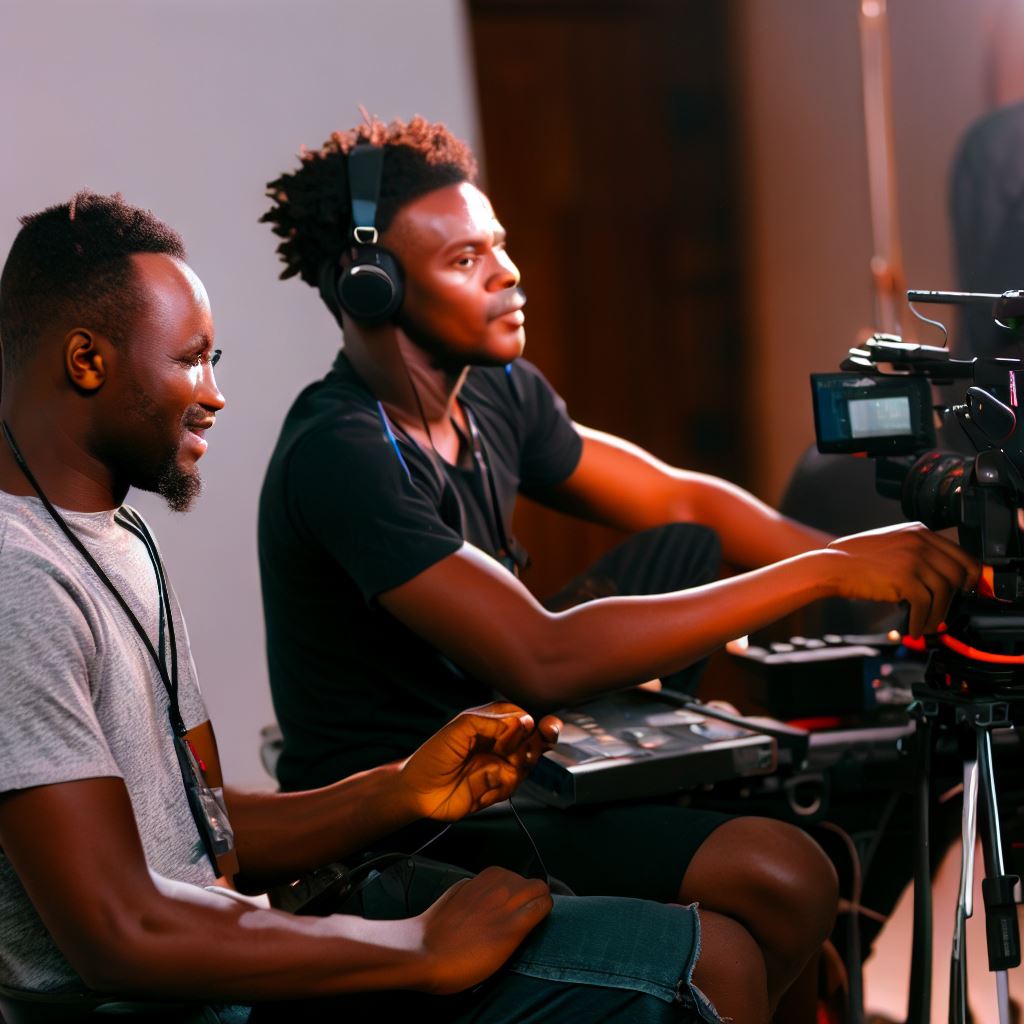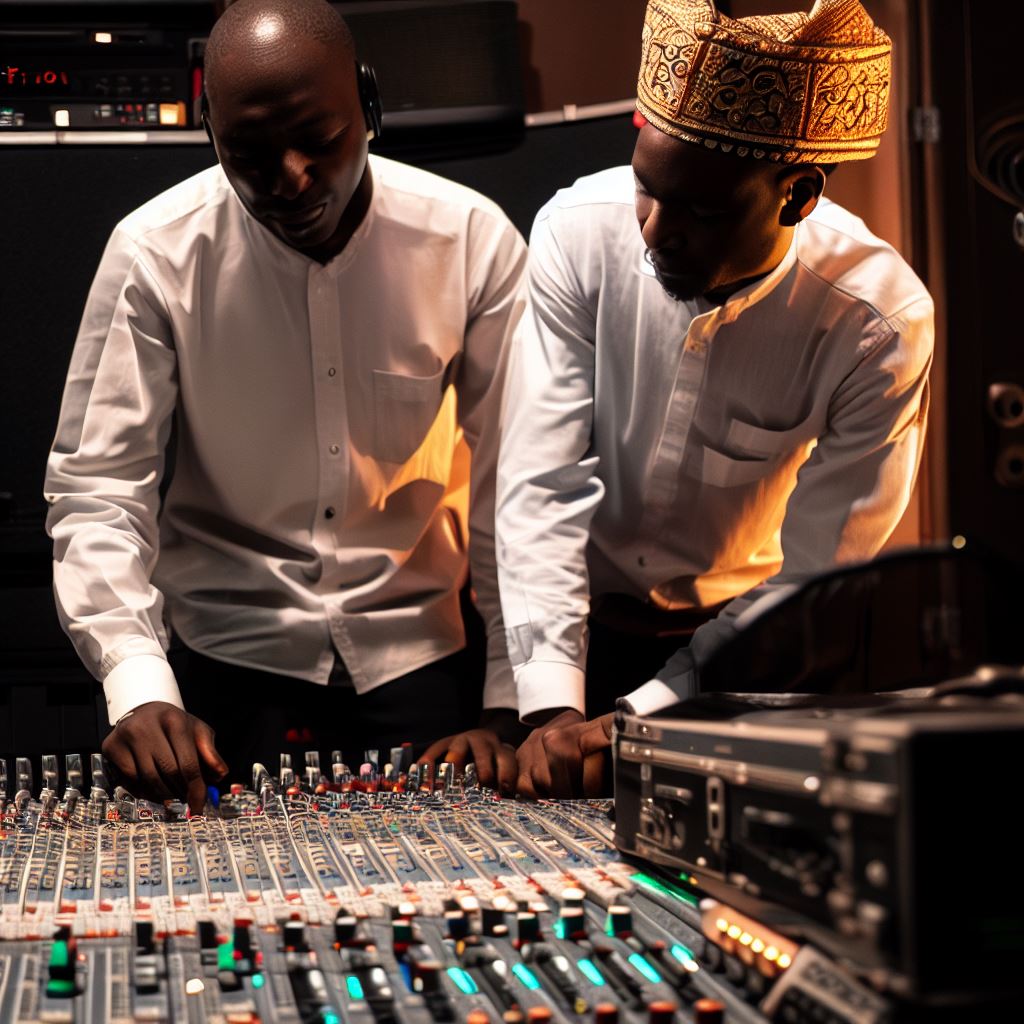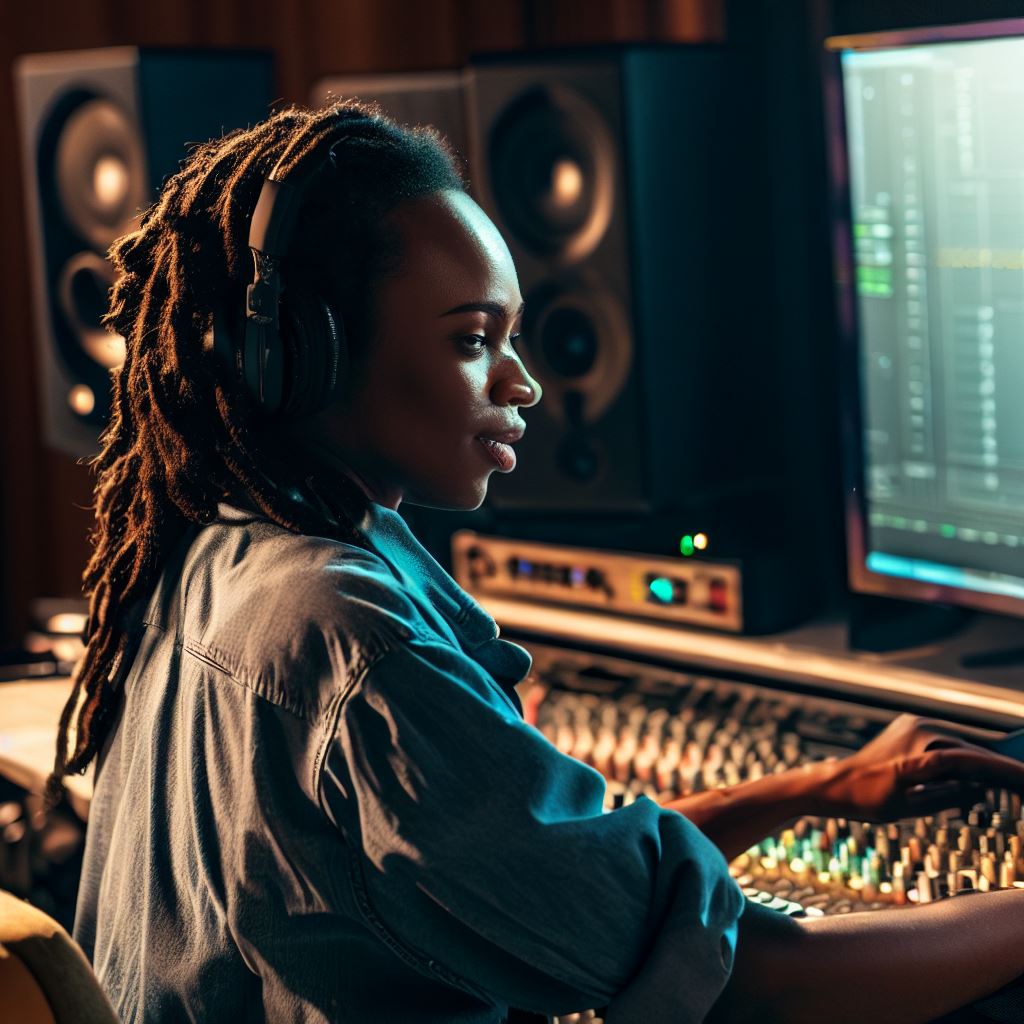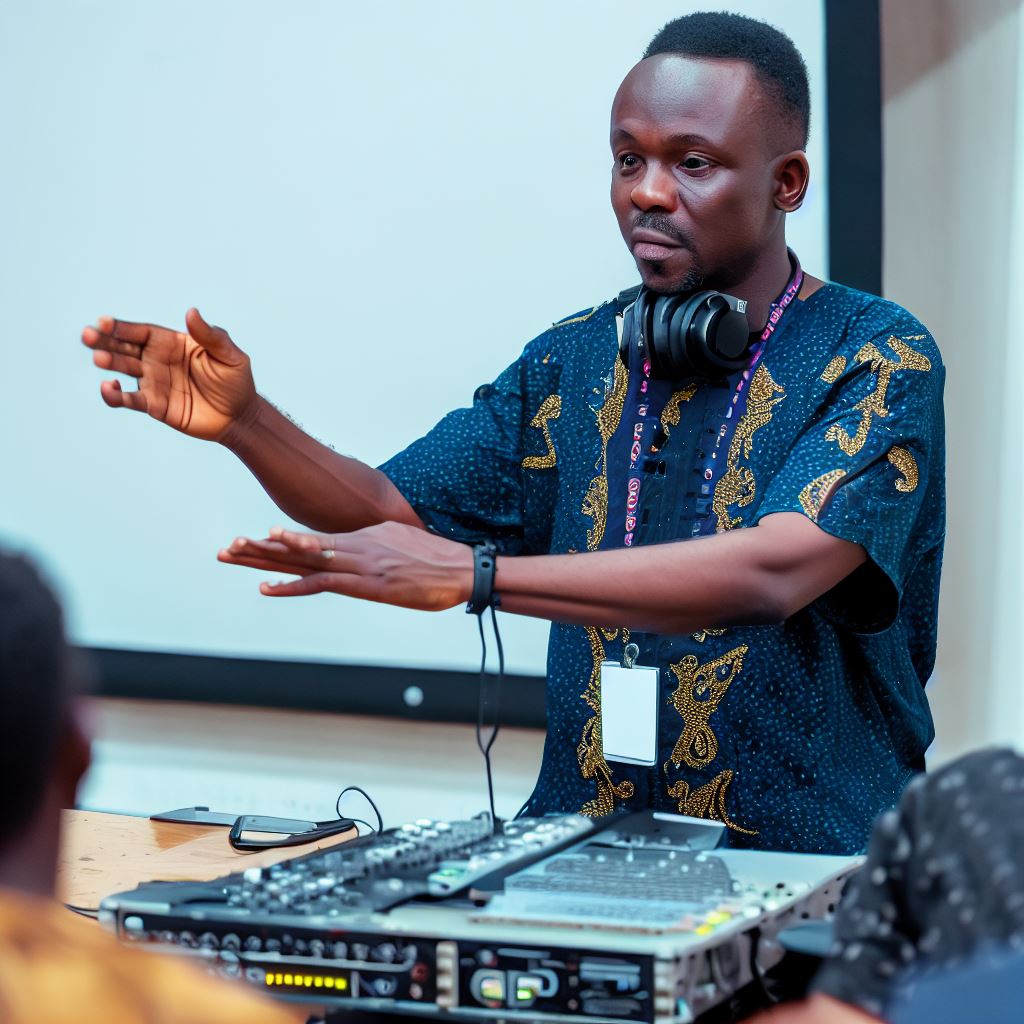Introduction
African rhythms have long been celebrated for their unique qualities and deep cultural significance.
In this blog post, we will explore how Nigerian film composers harness these rhythms to create powerful and evocative soundtracks.
Brief overview of African rhythms and their significance
- African rhythms are a fundamental aspect of the continent’s rich musical heritage.
- They have roots in traditional tribal music and have been passed down through generations.
- These rhythms are characterized by complex polyrhythms, syncopation, and an energetic pulse that is impossible to resist.
- They are the backbone of African music, connecting people and serving as a form of communication and expression.
Focus of the blog post on Nigerian film composers
- Nigeria has a vibrant film industry, commonly known as Nollywood, which produces a staggering number of movies each year.
- Nigerian film composers have the challenging task of creating captivating soundtracks that enhance the storytelling and immerse the audience in the film’s world.
- What makes these composers unique is their ability to draw from this rich rhythmic heritage, infusing their scores with the spirit and energy of African music.
- By delving into the techniques and inspirations of Nigerian film composers, we will gain a deeper understanding of how they utilize African rhythms to create truly incredible cinematic experiences.
Throughout this blog post, we will explore specific examples and analyze the impact of these rhythmic choices on the overall film composition.
Join us on this rhythmic journey through Nigerian cinema and discover the power of African rhythms in film scoring.
Background on Nigerian Film Industry
Context on Nollywood, the Nigerian film industry
Nollywood, the Nigerian film industry, is the largest film industry in Africa and the second largest in the world. It emerged in the late 20th century and has since experienced remarkable growth and popularity.
Growth and popularity of Nollywood films
1. Independent Production
Nollywood films are primarily produced independently, often on low budgets, utilizing digital technology. This has allowed for a high volume of films to be produced each year.
2. Local Market Focus
Nollywood films are primarily created for the local market, catering to Nigerian and African audiences. This focus on local storytelling has contributed to the industry’s success and popularity.
3. Cultural Relevance
Nollywood films touch on various aspects of Nigerian culture, including traditions, customs, and social issues.
This cultural relevance has resonated with audiences who feel a strong connection to the storylines portrayed on screen.
4. Accessibility and Affordability
Nollywood films are widely accessible and affordable, making them appealing to a large portion of the population.
DVDs and VCDs are sold on street corners, allowing even those with limited resources to enjoy these films.
5. Language Diversity
Nollywood films are typically produced in multiple languages, including English, Yoruba, Igbo, and Hausa.
This linguistic diversity caters to different regions and ethnic groups within Nigeria, further expanding the audience base.
6. Cinematic Evolution
Over the years, Nollywood films have evolved in terms of production quality, storytelling techniques, and overall cinematic experience.
This evolution has attracted a broader international audience, contributing to the industry’s popularity.
7. Community Engagement
Nollywood films engage with their audience, often addressing social issues and offering a platform for dialogue. This sense of community involvement fosters a strong following and keeps viewers invested in the industry,
8. Global Recognition
Nollywood has gained recognition on an international scale, participating in film festivals and receiving nominations and awards.
This global exposure has further elevated the industry’s status and increased its popularity.
9. Economic Impact
The success of Nollywood has had a significant economic impact on Nigeria. The industry provides employment opportunities for a vast number of individuals, both on-screen talent and behind the scenes.
10. Influence on African Cinema
Nollywood’s growth and popularity have inspired other African countries to develop their own film industries. This influence has led to a more vibrant and diverse African cinema landscape.
Basically, Nollywood’s growth and popularity can be attributed to its independent production model, focus on local storytelling, cultural relevance, accessibility and affordability, language diversity, cinematic evolution, community engagement, global recognition, economic impact, and influence on African cinema.
This booming industry continues to captivate audiences not only in Nigeria but across the globe.
Read: Traditional Music’s Influence on Nigerian Film Scores
Importance of Music in Nigerian Films
The essential role of music in Nigerian movies
Music plays a crucial role in Nigerian films, adding depth and enhancing the storytelling experience.
- Emotional Connection: Music in Nigerian films establishes an emotional connection with the audience, evoking feelings and enhancing the overall impact of the scenes.
- Setting the Mood: Nigerian film composers use music to set the mood of a scene, whether it is suspense, romance, or celebration. This helps to engage the audience and keep them invested in the story.
- Cultural Representation: Music in Nigerian films serves as a powerful tool for cultural representation, showcasing the diverse musical traditions and rhythms of the country. It adds authenticity and allows the audience to experience Nigerian culture in a unique way.
- Character Development: The music chosen for a character’s theme or background reflects their personality, providing insights into their emotions and motivations. This helps in developing well-rounded and relatable characters.
Connection between music and storytelling in Nigerian films
1. Enhancing Dialogue
Music complements the dialogue in Nigerian films, highlighting important moments or emphasizing certain phrases. It adds a layer of depth and enhances the impact of the dialogue.
2. Pacing and Timing
Nigerian film composers use music to control the pacing and timing of a scene, creating tension or releasing it at strategic moments. This keeps the audience engaged and heightens the overall cinematic experience.
3. Foreshadowing and Symbolism
Music in Nigerian films often foreshadows events or symbolizes certain themes, creating a deeper connection between the audience and the story. It adds layers of meaning and enhances the overall narrative.
4. Unifying Elements
Music serves as a unifying element in Nigerian films, bridging the gap between different cultures and languages. It brings people together through shared emotions and experiences.
5. Recognizable Soundtracks
Iconic Nigerian film soundtracks have become synonymous with the movies themselves, creating lasting impressions on the audience and becoming cultural phenomena.
6. Cultural Preservation
Music in Nigerian films helps in preserving and promoting traditional rhythms, languages, and musical styles that might otherwise be forgotten. It serves as a vehicle for cultural heritage and identity.
7. Marketability
Catchy and well-composed music in Nigerian films contributes to their marketability and commercial success. Memorable soundtracks attract a wider audience and increase the chances of international recognition.
8. Collaboration and Employment
The importance of music in Nigerian films also extends to the music industry itself. Film composers, musicians, and artists find employment opportunities through the creation of original soundtracks.
In essence, music holds immense importance in Nigerian films as it enhances storytelling, connects emotionally with the audience, and represents the rich cultural heritage of the country.
It plays a significant role in character development, foreshadowing, and setting the mood.
Additionally, music in Nigerian films serves as a unifying element and contributes to the marketability and preservation of cultural traditions.
Read: Breaking Down the Film Composer Salary in Nigeria
Understanding African Rhythms
Define African rhythms and their characteristics
- African rhythms are complex patterns of beats and sounds that are a fundamental part of African music.
- These rhythms are characterized by their syncopated and polyrhythmic nature.
- African rhythms are known for their energetic and spirited qualities that create a lively and vibrant sound.
Cultural and historical roots of African rhythms
- The cultural and historical roots of African rhythms can be traced back to the rich and diverse traditions of Africa.
- These rhythms have been deeply embedded in African culture for centuries, playing a significant role in religious ceremonies, social gatherings, and storytelling.
- African rhythms are a reflection of the African people’s connection with nature, their ancestors, and the spirits.
- In African culture, rhythms are used to communicate and express emotions, to unite communities, and to celebrate life’s milestones.
- Communities pass down African rhythms through oral tradition, infusing each generation’s unique twist and interpretation into the rhythm.
- The diversity of African rhythms is vast, as each region and tribe in Africa has its distinct rhythms and musical styles.
- West African rhythms, like Afrobeat, prominently feature percussion instruments such as the djembe, talking drum, and shekere.
- These rhythms are often accompanied by call-and-response vocals and energetic dancing.
- In Central and East Africa, the Swahili and Bantu influences can be heard in the rhythmic patterns.
- These rhythms incorporate a variety of percussion instruments like the ngoma and marimba, creating a melodic and rhythmic blend.
- Unique instruments like the mbira, creating a distinctive, hypnotic sound, characterize Southern African rhythms.
- The rhythms in this region often have a strong emphasis on repetition and call-and-response patterns.
African rhythms influence extends beyond Africa’s borders, resonating with musicians and audiences worldwide
- Many Nigerian film composers have recognized the power and versatility of African rhythms and incorporate them into their film scores.
- These composers use African rhythms to evoke emotions, create tension, and enhance the overall storytelling experience.
- African rhythms add a distinct flavor to Nigerian films, creating a sense of cultural authenticity and connecting the viewers to the rich African heritage.
- These rhythms often accompany scenes of celebrations, ceremonies, and everyday life, immersing the audience in the vibrant African culture.
Generally, African rhythms are an integral part of African culture and have a deep historical and cultural significance.
They are characterized by their syncopated and polyrhythmic nature, adding energy and vibrancy to African music.
Nigerian film composers have recognized the power of these rhythms and utilize them to enhance the storytelling experience in their films, creating a unique and authentic African sound.
By incorporating African rhythms into their scores, these composers are contributing to the preservation and celebration of African heritage.
Read: Exploring the Role of Film Composers in Nollywood

Nigerian Film Composers and their Use of African Rhythms
Nigerian film composers are highly skilled at infusing African rhythms into their music.
These composers honor their cultural roots by incorporating traditional African music elements.
Prominent Nigerian film composers who incorporate African rhythms
- One prominent composer is Fela Sowande, known for his use of Yoruba drumming patterns in his compositions.
- Another notable composer is Mike Aremu, who blends Nigerian juju music with modern film scores.
- African rhythms serve as a powerful tool for composers to convey emotions and enhance storytelling.
- They create a unique atmosphere and immerse the audience in the cultural context of the film.
- The diversity of Nigerian film composers ensures a wide range of African rhythms are incorporated into soundtracks.
- The use of African rhythms in these films brings an authentic touch to the storytelling and reflects Nigeria’s rich musical heritage.
- Nigerian film composers continue to push boundaries in their use of African rhythms, fusing traditional and contemporary sounds.
- Their music not only enhances the films but also serves as a celebration of Nigerian culture and heritage.
Examples of films and soundtracks that highlight the use of African rhythms
Nollywood films often feature soundtracks that utilize African rhythms to enhance the storytelling.
- The film “The Figurine” directed by Kunle Afolayan incorporates traditional Nigerian percussion instruments such as the talking drum.
- In the movie “Half of a Yellow Sun” directed by Biyi Bandele, the soundtrack includes West African highlife and Afrobeat rhythms.
- These films exemplify how Nigerian composers use African rhythms to create a sense of cultural authenticity.
- African rhythms add depth and emotion to the films, reflecting the rich tapestry of Nigerian culture.
- In addition to these well-known composers, there are many others who also showcase their talents in Nigerian cinema.
- For instance, Tunde Jegede incorporates the kora, a West African string instrument, into his film scores.
- The film “October 1” directed by Kunle Afolayan demonstrates Jegede’s masterful use of African rhythms.
- Other films that highlight the use of African rhythms include “Mother of George” and “The Wedding Party.”
In short, Nigerian film composers have mastered the art of incorporating African rhythms into their music.
Prominent composers like Fela Sowande, Mike Aremu, and Tunde Jegede showcase their talents in film scores
Films such as “The Figurine,” “Half of a Yellow Sun,” and “October 1” exemplify the use of African rhythms.
These compositions add depth and authenticity to the films, immersing the audience in Nigerian culture.
The use of African rhythms in Nigerian cinema is a testament to the rich musical heritage of the country.
Read: Top 10 Most Influential Nigerian Film Composers
Analysis of Specific Techniques and Elements –
Different techniques used by Nigerian film composers to incorporate African rhythms
- Incorporating African rhythms is a fundamental aspect of Nigerian film composers’ work.
- One technique used is the strategic placement of percussive elements within the composition.
- By layering rhythmic patterns from different African regions, composers create a unique fusion.
- Syncopation, a common element in African music, is skillfully integrated to add complexity to the composition.
- The use of polyrhythms, combining multiple rhythms simultaneously, is a signature technique in Nigerian film scores.
- Nigerian composers also utilize call-and-response patterns, echoing the cultural tradition of African music.
Use of specific instruments, melodies, and harmonies
- They cleverly incorporate the use of specific instruments to reinforce the African rhythmic elements.
- Traditional African instruments like the djembe, talking drum, and shekere feature prominently in Nigerian film scores.
- These instruments provide the authentic African sound and contribute to the rhythmic foundation of the compositions.
- Composers experiment with melodies that reflect the melodic structures found in traditional African music.
- The use of pentatonic scales, prevalent in African musical traditions, adds a distinct flavor to the compositions.
- Harmonies in Nigerian film scores often draw inspiration from traditional African vocal harmonies.
- The composers skillfully blend Western harmony with these African vocal harmonies to create a unique sound.
The incorporation of African rhythmic elements and techniques is not limited to just action or cultural-themed films.
- Nigerian composers have successfully integrated African rhythms into various genres, including romantic and suspenseful films.
- The use of African rhythms creates a sense of authenticity and cultural identity in Nigerian film soundtracks.
- It enhances the emotional impact of the scenes and connects the audience with the African roots of the story.
- The integration of African rhythms in Nigerian film scores has gained international recognition and appreciation.
- This recognition has led to collaborations between Nigerian composers and filmmakers from different countries.
- Collaborations worldwide integrate African rhythms into diverse film industries, expanding their global influence and cultural richness.
In fact, Nigerian film composers employ various techniques to incorporate African rhythms into their compositions.
By strategically placing percussive elements, utilizing rhythm patterns from different regions, and incorporating syncopation and polyrhythms, they create a fusion of African sounds.
Specific instruments like the djembe and shekere reinforce the rhythmic foundation, while melodies and harmonies draw inspiration from traditional African music.
The integration of African rhythms adds authenticity and cultural identity to Nigerian film soundtracks, transcending genre boundaries.
This recognition has furthered collaborations between Nigerian composers and international filmmakers, spreading the influence of African rhythms far and wide.
Read: Nollywood: Understanding Nigeria’s Film Music Landscape
Impact of African Rhythms in Nigerian Films
Impact of African rhythms on the overall viewing experience
African rhythms have a profound impact on Nigerian films, enhancing the overall viewing experience.
- Nigerian films, popularly known as Nollywood, have gained global recognition for their unique storytelling and cultural representations.
- One of the key elements that contributes to the authenticity of Nigerian films is the prominent use of African rhythms.
- African rhythms, characterized by vibrant beats and intricate patterns, create a captivating and immersive auditory experience for viewers.
- The rhythmic beats resonate with the emotions of the scenes, intensifying the impact of the narrative on the audience.
- In Nigerian films, African rhythms serve as a powerful tool for storytelling, effectively conveying the cultural essence and emotional depth of the characters.
- The lively beats synchronize with the dance sequences, adding an infectious energy and making the scenes more entertaining and engaging.
- The impact of African rhythms extends beyond the auditory experience, influencing the overall visual and emotional aspects of the films.
- These rhythms have the power to evoke specific emotions, intensify suspenseful moments, and add depth to the characters’ expressions.
- The fusion of African rhythms with visual storytelling creates a multisensory experience that captivates the audience’s attention.
How African rhythms contribute to the authenticity and cultural representation in Nigerian films
- The use of African rhythms also creates a sense of familiarity and connection for Nigerian viewers, as it reflects their cultural heritage.
- African rhythms not only entertain but also educate the audience about Nigeria’s rich musical traditions and cultural diversity.
- The incorporation of these rhythms in Nigerian films serves as a celebration of the country’s artistic heritage, fostering national pride.
- By showcasing African rhythms in Nigerian films, composers and filmmakers play a vital role in preserving and promoting these traditions.
- African rhythms contribute to the cultural representation in Nigerian films by showcasing the diversity and richness of African music.
- The inclusion of traditional instruments, such as drums and percussion, highlights the importance of cultural preservation and authenticity.
- Nigerian film composers skillfully blend African rhythms with modern soundscapes, creating a unique audiovisual experience.
- By infusing African rhythms into their compositions, Nigerian film composers pay homage to their roots while also embracing contemporary influences.
- The impact of African rhythms on the viewing experience extends to international audiences, who appreciate the authenticity and cultural vibrancy portrayed in Nigerian films.
- Nigerian films with African rhythms create a distinctive identity that sets them apart from other film industries worldwide.
- The recognition and appreciation of African rhythms in Nigerian films have opened doors for collaborations and cultural exchanges with filmmakers from around the globe.
In essence, African rhythms play a significant role in Nigerian films, profoundly impacting the overall viewing experience.
They contribute to the authenticity, cultural representation, and emotional depth of the films, creating a multisensory experience for both Nigerian and international audiences.
The vibrant beats and captivating patterns of African rhythms add an undeniable authenticity and cultural vibrancy to Nigerian films, making them stand out in the global film industry.
Read: The Economic Impact of Film Composing in Nigeria
You Might Also Like: Key Skills Every Nigerian Music Director Should Have
Conclusion
Summarize the importance of African rhythms in Nigerian film composition
Lastly, African rhythms play a vital role in Nigerian film composition, adding a rich cultural element.
Emphasize the unique contribution of Nigerian film composers in incorporating African rhythms in their work
Nigerian film composers have made unique contributions by skillfully incorporating these rhythms into their work, creating a distinct and vibrant musical experience.




